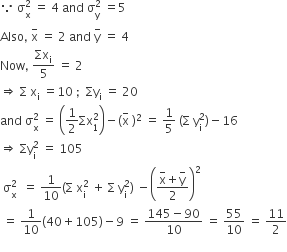 Multiple Choice Questions
Multiple Choice QuestionsThe mean of the data set comprising of 16 observations is 16. If one of the observation value 16 is deleted and three new observations valued3,4 and 5 are added to the data, then the mean of the resultant data is
16.8
16.0
15.8
15.8
All the students of a class performed poorly in Mathematics. The teacher decided to give grace marks of 10 to each of the students. Which of the following statistical measures will not change even after the grace marks were given?
Mean
Median
Mode
Mode
If the mean deviation about the median of the numbers a, 2a, ....., 50a is 50, then |a| equals
2
3
4
4
For two data sets, each of size 5, the variances are given to be 4 and 5 and the corresponding means are given to be 2 and 4, respectively. The variance of the combined data set is
5/2
11/2
6
6
B.
11/2

If the mean deviation of the numbers 1, 1 + d, 1+ 2d, ... , 1 + 100d from their mean is 255, then the d is equal to
10.0
20.0
10.1
10.1
The mean of the numbers a, b, 8, 5, 10 is 6 and the variance is 6.80. Then which one of the following gives possible values of a and b?
a = 0, b = 7
a = 5, b = 2
a = 1, b = 6
a = 1, b = 6
A value of C for which the conclusion of Mean Value Theorem holds for the function f(x) = logex on the interval [1, 3] is
2log3e
loge3/2
log3e
log3e
If in a frequently distribution, the mean and median are 21 and 22 respectively, then its mode is approximately
22.0
20.5
25.5
25.5
In a series of 2n observations, half of them equal a and remaining half equal –a. If the standard deviation of the observations is 2, then |a| equals
1/n

2
2
Standard deviation of n observations a1, a2, a3, ... , an is 0. Then, the standard deviation of the observations is
